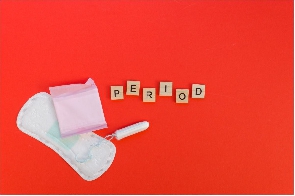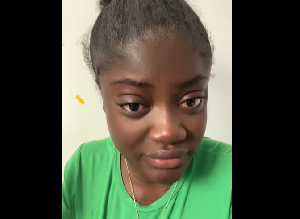GhanaWeb Feature: Every month, girls and women see blood – of course except there is pregnancy or some complications with the reproductive system. This is called the menstrual cycle; some call it period. Menstruation is the monthly shedding of the lining of one’s uterus and during this period, hygiene is very critical. During this period, products such as sanitary towels are used to by females. Regular changing of sanitary towels, pads and other products are vital to managing one’s period. According to Unicef, poor menstrual hygiene can pose physical health risks and has been linked to reproductive and urinary tract infections. Providing access to private facilities with water and safer low-cost menstrual materials could reduce urogenital diseases. Regardless of this, many girls and women have limited options for affordable menstrual materials in Ghana. The price of sanitary pads keeps increasing. While menstruation is experienced by every female, this piece would like to focus on the girl child in Ghana and how the ordinary girl child is affected by the price hikes in sanitary pads as part of efforts to raise awareness on World Girl Child Day. The price of pads: Even for the average middle-income earning Ghanaian, pad is now expensive. It costs between GH¢10 and GH¢15 to purchase a single pack of sanitary pad every month. And this price is just for the moment because there are continuous increases depending on price hikes in the country. In 2021 for instance, pads cost between GH¢5 and GH¢6 and even at this rate, girls in rural communities especially could not afford this on a monthly basis. It is even more worrying that the taxes which the ruling government promised to eliminate on the importation of pads are yet to be removed. Sanitary pads are classified as luxury products under the Ghana Revenue Authority guidelines and are therefore taxed with a 20% levy. Girls stay home, get pregnant because of sanitary pads: In Ghana, particularly in the rural communities, some girls are forced to stay home, away from school for fear of embarrassing themselves with blood stains because they cannot afford sanitary pads. In some other cases, the girl child is forced to drop out of school for same reasons – they cannot afford sanitary pads or products to use monthly during their periods. Some other reports including one by the Ghanaiantimes have indicated how a study on adolescent sexual and reproductive health (ASRH) in the Wa East District revealed that 83 per cent of adolescent-girl respondents in the study said they engaged in pre-marital sex in order to get money for sanitary pads. The study which was conducted in April and May this year with 300 respondents, also revealed that 41 per cent of the girls who engaged in unprotected sex became pregnant, and ended up as teenage mothers who were sometimes forced into early marriages. The 20% taxes, what the government has said and what is happening Vice President, Dr. Mahamudu Bawumia, in August 2022 said the scrapping of a 20% luxury levy will reduce the cost of imported sanitary pads. Per his statement, this will tackle the issue of menstrual hygiene and improve the health conditions of girls nationwide. “We will eliminate import duties on sanitary pads to improve health conditions, particularly for girls. It is very important. What we intend doing is to make sure we produce sanitary pads in Ghana until that happens in their numbers, we are going to eliminate import duties to bring down their cost,” he said. This is still yet to reflect; girls keep bearing the brunt of these heavy taxes. World Girl Child Day: Day of the Girl Child is observed on October 11 every year. International Day of the Girl Child was first observed on October 11, 2012, by the United Nations. This year commemorates the 10th anniversary of the International Day of the Girl. The day focuses attention on the need to address the challenges girls face and to promote girls’ empowerment and the fulfilment of their rights. The theme of International Day of the Girl Child this year is "Our time is now—our rights, our future". This links to the United Nation’s Sustainable Development Goal (SDG) 5 which particularly focuses on women and girls - “Achieve Gender Equality and Empower All women and Girls”. · Of 17 Goals, 10 of them indirectly focus on the girl child with regards to ending poverty, ending hunger, ensuring health lives, promoting equitable education, gender equality, clean water and sanitation, decent work, reduced inequalities, sustainable cities and peace, justice & institutions. The integration of welfare and rights of girl child is however more dominant in SDG 5 and SDGs on health (SDG 3) and education (SDG 4). You can also watch this episode of People & Places on GhanaWeb TV:
Health News of Tuesday, 11 October 2022
Source: www.ghanaweb.com













